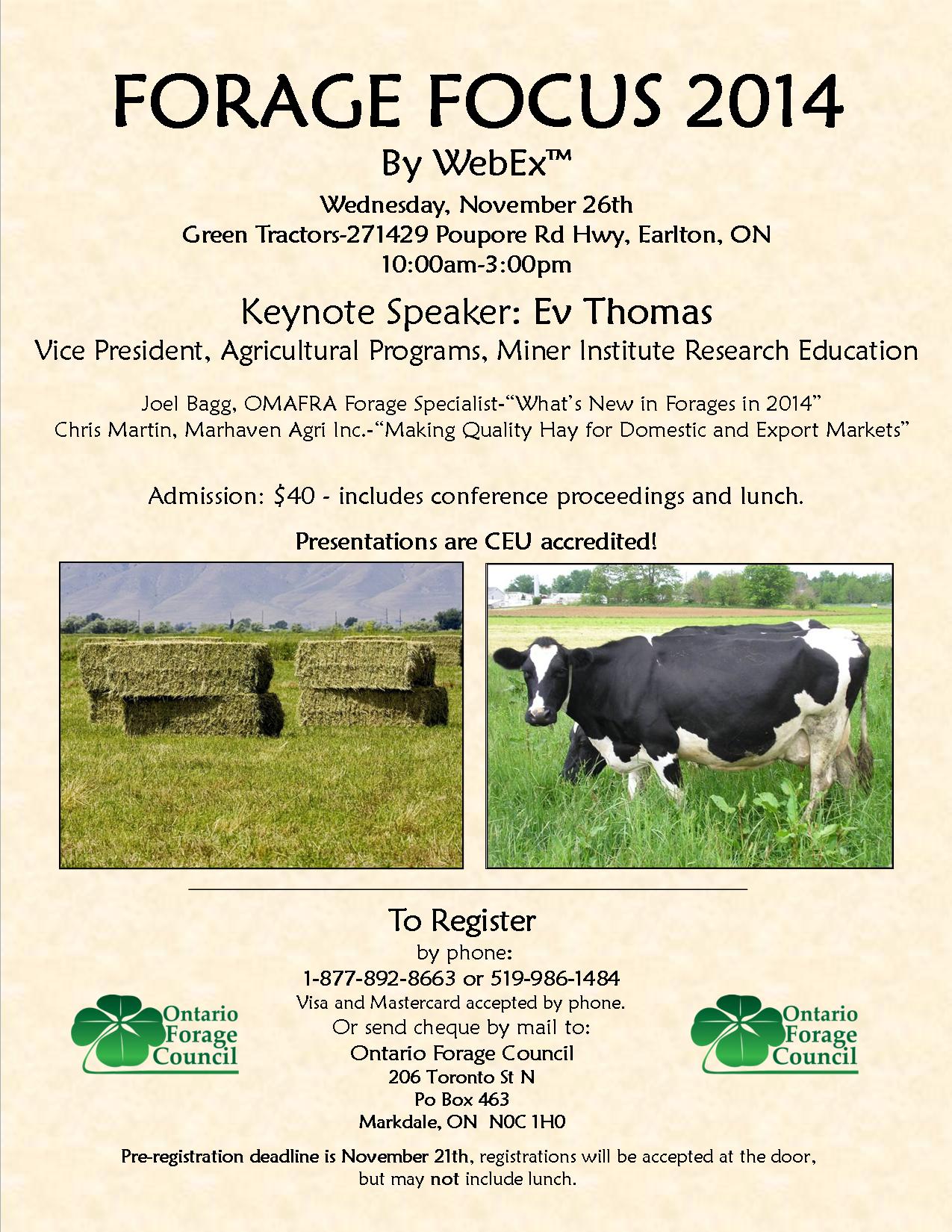Event Details
Time: November 25, 2014 from 9am to 3pm
Location: St-Albert Community Centre
Street: 201 Principale Street
City/Town: St-Albert
Website or Map: https://www.google.ca/maps/pl…
Phone: 1-877-892-8663
Event Type: conference
Organized By: Ontario Forage Council
Latest Activity: Nov 20, 2014
Event Description
The Ontario Forage Council is proud to announce our upcoming annual Forage Focus Conference 2014, this years’ theme is: “Using Forages to Increase Profitability”. The conference will be held in St-Albert on Tuesday, November 25th at the St-Albert Community Centre, and in Shakespeare on Wednesday, November 26th at the Shakespeare Optimist Hall. Presentations are CEU accredited.
This years’ keynote speaker is Ev Thomas Vice President, Agricultural Programs, Miner Institute Research Education. Mr. Thomas will be speaking on two topics, “Harvest Management of Forage Crops and Corn Silage”, and “Alfalfa vs. Alfalfa Grass: Different Strokes for Different Folks-and Fields”. Ev Thomas has worked as an agronomist in Northern N.Y. since 1966, first as a regional Extension Specialist for Cornell University and since 1981 for Miner Institute. He received his B.S. in Animal Husbandry from the University of Connecticut and his M.S. in Extension Education from Cornell University. Responsibilities include agricultural production, research and education. He is a frequent contributor to Hoard’s Dairyman and Northeast Dairy Business, and has a monthly column in Farming magazine. He has been involved in field crops consulting in the North America, Europe, Australia, New Zealand, and Japan. In 1999 he received the Outstanding Alumnus Award from the University of Connecticut, in 2001 the Merit Award from the American Forage and Grassland Council, and in 2003 the Award of Merit from Gamma Sigma Delta, the honor society of agriculture. He is a Certified Crop Advisor and Certified Pesticide Applicator. The Ontario Forage Council welcomes Mr. Thomas to Ontario, an enthusiastic speaker with information that you can put to use immediately.
Joel Bagg, Forage Specialist, OMAFRA will speak on “What’s New in Forages in 2014”. Attendees in each location will be treated to firsthand knowledge on “Making Quality Hay for Domestic and Export Markets”. This presentation will be delivered by Andre Larocque in St-Albert, and Fritz Trauttmansdorff in Shakespeare.
The cost of this years’ conference is $40, and includes conference proceedings and a hot roast beef lunch. Books of 10 tickets are available to treat customers, or staff. Registration deadline is November 20th, registrations will be accepted at the door, but may not include the hot roast beef lunch. Registration is available by phone, or mail. Visa and Mastercard accepted by phone. Please make cheques payable to the Ontario Forage Council.
Tradeshow and sponsorship opportunities are still available for both days of this conference. Spaces will fill quickly, so don’t hesitate. Forage Focus is an excellent opportunity to advertise your business to the entire province!
© 2026 Created by Darren Marsland.
Powered by
![]()

RSVP for Forage Focus 2014 Conference and Trade Show to add comments!
Join Ontario Agriculture